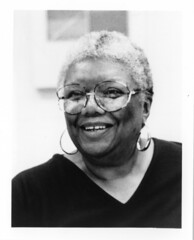On this Saturday afternoon of Labor Day weekend, I discovered this lecture while sitting at the dining room table at my grandmother's house, my mom's mom, in South Jersey.
Mimi is 93 and we believe these may be her final days after a series of strokes. She has been sleeping all day. Occasionally, she wakes enough to drink some milk through a straw or ice-chips.
I want to write her a poem, but words fail me at the moment - my inner voice tied in knots.
Yet I found this Mark Doty lecture on poetry inspiring, and perhaps, the words will work their way to the page soon.
In the meantime, I think of my students, especially my juniors that will write and rewrite. Each student must find his or her voice. Each student must discover his or her "unmistakable self" via writing.
Read and listen to the Mark Doty - click here:
lecture in its entirety at Poetry.org:
Mark Doty defines poetic voice as:
That inner voice is certainly related to the voice we use when we talk to the world and reflect in it, but they aren’t the same thing. I doubt any of us sounds to other people the way we sound in our own heads. Poetic voice is an attempt to make a version of that illusive inferiority, to bring it into the light of the page. Or maybe, more accurately, to fuse the inner voice with the outer one in order to make a speaking presence on the page that feels like ourselves. “Feels like ourselves.” It sounds simple, but it’s anything but. I couldn’t begin to explain how it’s done, save to suggest that a very long work of practice and refinement goes into what would seem natural: sounding like yourself, your unmistakable self. Is it still possible to talk about an unmistakable self?
Doty references Robert Lowell, Adrienne Rich, Sylvia Plath,
Mark Halliday,
Elizabeth Alexander, Walt Whitman, Emily Dickinson, and more.
Early Excerpt :
The title of my talk this evening is “Tide of Voices: Why Poetry Matters Now," but I’m going to invite those of you who are uncomfortable with sentences that don’t go all the way out to the end of the page to substitute ‘literature’ for that word ‘poetry’ when you hear it, because I think my remarks will be applicable to all sorts of literary forms. And I want to begin with a quotation from the contemporary American poet Elizabeth Alexander. A little line or two of Elizabeth’s provides an epigraph for my talk. This is a poem in which the speaker is a teacher who has grown frustrated with her class. The class believes that poetry is all rainbows and sweetness and love. And she says to them, "‘Poetry,' I tell them, ‘is the human voice, and we are of interest to one another. Are we not?'"
So this is “Tide of Voices.” In the early 1940s, the psychologist Abraham Maslow constructed a hierarchy of basic needs, a famous description of what human beings require. Above all else, he said, we need to be safe. When you’re out of danger you can think about food and water, and when you have those things you can think about shelter, and once you have that you can turn to your emotional needs. When you’re safe, fed, out of the weather, and loved, he thought, then you can turn your attention to a more complex human need and desire to create.
Now, obviously, there’s a certain truth in this scheme. When you have a pressing need to get warm, for instance, or you’re driving on the freeway and trying to get out of the path of a terrifying truck, you probably aren’t thinking about a poem or a story you want to write. But it also seems clear that there’s a certain middle class perspective inherent in Dr. Maslow’s scheme. For most of the world, the kind of stable conditions he believed were necessary for human beings to be free to invest their energies in creative work simply do not exist. Not in a reliable way. All over the world food and water and shelter are often in question...
Doty makes a case for "why do we read literature?"
People who read imagine the lives of others. Literature makes other people more real to us. It invites us to notice differences but, even more so, points toward commonality. Novels and poems and plays can’t help but suggest that the subjectivity of others is real. That they have the same claims on dignity and compassion and a good life we ourselves do. If you speak up, our punishment said, we won’t let you read. As if our school administrators understood that it was reading that had led to our troublemaking in the first place. Perhaps it really was, in that indirect fashion in which art does its work—The Great Gatsby that had led us to understand that the people of Vietnam had hopes and aspirations like our own. Maybe it was Slaughterhouse Five that led us to see that we could remain silent and thus choose absurdity, or we could open our mouths and risk having our books taken away...
Doty then reads a poem that will make you think again about the power of poetry:
Revenge by Taha Muhammad Ali, translated by Peter Cole, Yahya Hijazi and Gabriel Levin
Mark Doty concludes:
May poetry indeed be a language for a new century. A way to place value on the dignity, specificity, and beauty of individual lives. A way to resist the streamlining diminishment of categories and generalizations. A way to speak, a way to be heard.


